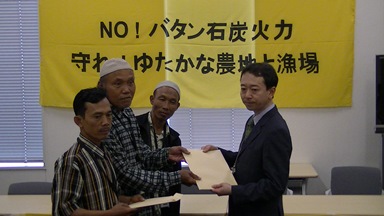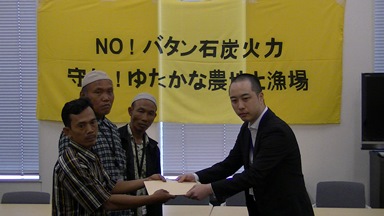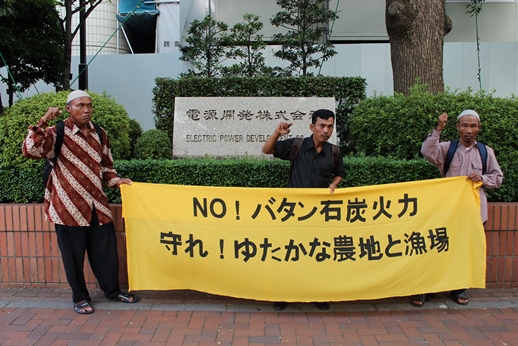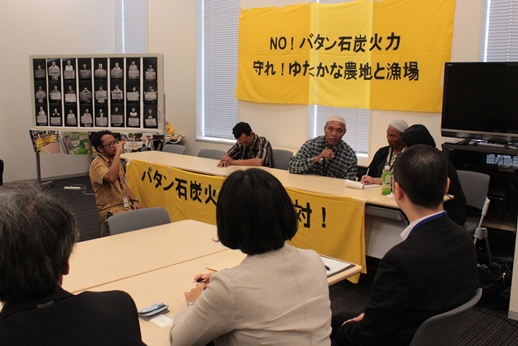Indonesian Farmers and Fisherman Came Over to Japan to File their Objection
"The Proposed Batang Coal-fired Power Plant Has Made Our Life Worse and Has Caused Human Rights Violations."
Non-compliances of JBIC / OECD Guidelines are Found
August 3, 2015
On July 29, 2015, three villagers affected by "Batang coal-fired power plant project in Central Java, Indonesia" (*1) came over to Japan, and handed their objection to the Japan Bank for International Cooperation (JBIC) and their complaint to the Japanese National Contact Point (NCP) (*2) under the OECD Guidelines for Multinational Enterprises (MNEs). Japanese public and private sectors are trying to push through this project, which the local community has continued to oppose for four years.


Download available here:
> Objection to JBIC (“Objection Regarding the Central Java Coal-fired Power Plant Project in Indonesia” signed by 23 residents)
> Complaint to Japanese NCP (“Complaint Against ITOCHU and J-POWER Regarding the Central Java Coal-fired Power Plant Project in Indonesia” signed by 23 residents)
23 leaders of the local community organization “Paguyuban UKPWR” established for the sake of defending their land and sea from the said coal-fired power plant project signed the objection to JBIC and the complaint to Japanese NCP. In these papers, the local community pointed out how the project has failed and will fail to comply with “JBIC Guidelines for Confirmation of Environmental and Social Considerations” and “OECD Guidelines for MNEs,” as it has made/will make their life worse and has caused/will cause the violations of human rights. They urged JBIC, who is currently considering its finance for the project, to carefully investigate the problems and concerns through direct dialogue with the project-affected community, and Japanese NCP to encourage the Japanese companies (ITOCHU and J-POWER) to take appropriate action, and demanded the cancelation of the project.
Three Diet members, namely Mr. Motoyuki Odachi (a member of the House of Councilors: Democratic Party), Ms. Akiko Kurabayashi (a member of the House of Councilors: Japanese Communist Party), and Mr. Yukihiro Shimadzu (a member of the House of Representatives: Japanese Communist Party), personally witnessed the three Batang community members submitting their objection papers at the building for members of the House of Councilors in the afternoon of July 29.
The project has faced the strong opposition of the local community who are concerned about the impact on livelihoods, such as agricultural land and fishing grounds, and has had difficulties in land acquisition. The commencement of the construction has been postponed for three years. Until today, 71 landowners have refused selling their land for the project. However, in some farmland where landowners have already sold their land, there are some farmers who haven’t been able to do agriculture and are forced to suffer hard life. In addition, Indonesian military began the work of land clearing at the part of the proposed construction site in April 2015. Like this, it is found that the pressure to suppress the opposition voices of local community has been intensified.
During their visit to Japan from July 29 to August 1, three villagers appealed the followings to the Japanese public in Tokyo and Kyoto.


"I was imprisoned for seven months due to the false crime which I have never committed. After all, I was finally released in December 2014. But this year, the Indonesian military has made the earth dikes surrounding my farmland, which has prevented the irrigation water from reaching my rice field. Despite I haven’t yet sold my land to the project company.” (A landowner and farmer)
"Our farmland is the only one source of our livelihood. Also, the traditional grave has been inherited from our ancestors, but will be also lost by this project. Please do not push through the project in our land of Batang. Do the Japanese people want the Japanese government and companies to get involved in this kind of destructive project?" (A landowner and farmer)
"Due to the constructions of the other coal-fired power plants in Indonesia, a number of fishermen have lost their fishing grounds, and have fallen into hard life. We don’t want to experience the same fate. In addition, this project has been already causing a large number of human rights violations. Japan should immediately withdraw from this project." (A fisherman)
How should we, as Japanese citizens, respond to these urgent complaints from the local community? ------ While Japanese government has currently announced its policy to double the export of infrastructure projects for Asian countries, the objection to JBIC and the complaint to Japanese NCP filed by the Batang local community call our attention on the necessity for the Japanese public and private sectors to more sincerely address the environmental, social and human rights issues inevitable as a shadow of large infrastructure exports.
(*1) Batang Coal-fired Power Plant Project, Central Java, Indonesia
Two Japanese companies, J-POWER and ITOCHU, have already decided to invest in the project. Japan Bank for International Cooperation (JBIC) is currently considering its finance for the project. The loan amount is allegedly around 40 percent of the entire project cost (approximately US$ 4 billion). If built, the power plants (2,000 MW) will be one of the biggest coal-fired power plants in Southeast Asia.
See more details (only available in Japanese) https://www.foejapan.org/aid/jbic02/batang/index.html
(*2) NCP: National Contact Points
NCPs are composed and organized by each adhering governments such that they promote and implement the Guidelines, and provide an effective basis for dealing with the broad range of issues covered by the Guidelines. Japanese NCP consists of Ministry of Foreign Affairs (OECD Division, Economic Affairs Bureau), Ministry of Health, Labor, and Welfare (International Affairs Division), and Ministry of Economy, Trade and Industry (Trade and Investment Facilitation Division, Trade and Economic Cooperation Bureau).

